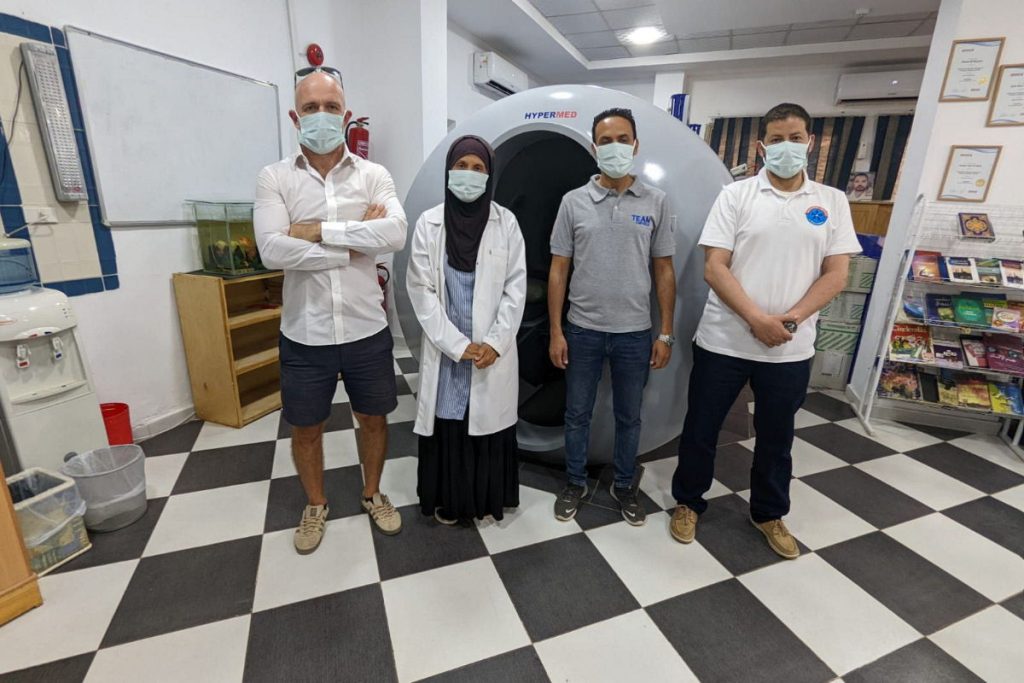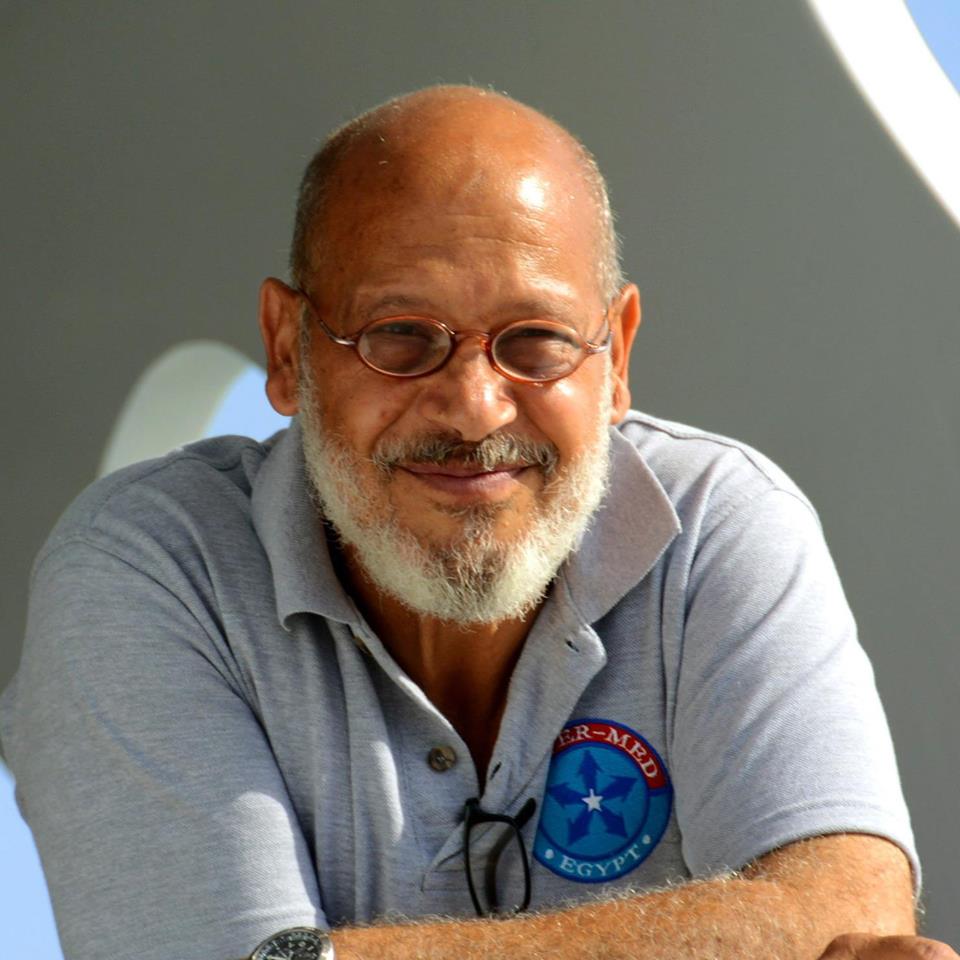We are blessed in Egypt to have a network of professional recompression chambers in locations convenient for any diving medical issue – emergency or routine.
At Emperor Divers, we support the Hyperbaric Medical Center in Sharm el Sheikh, HyperMed in Hurghada and Baro Medical in Marsa Alam.
The on-site doctor at Baro Medical is Dr Hossam Nasef and Luke Atkinson, our general manager at Emperor Divers Red Sea, caught up with him for an incredibly interesting chat.
Tell us your backstory please
I got my Masters in Diving Medicine in the early 1980s and I’ve worked ever since in Red Sea diving medicine.
I had my first posting in Sharm el Sheikh in 1985 – the diving was incredible! I came over to Hurghada in 1988, to the chamber that was in Magawish at the time, before bouncing back between Sharm and Hurghada in the 1990s.
I helped set up the chambers in El Gouna and Safaga before starting my own chamber, Baro Medical, in Marsa Shagra (Marsa Alam) in 2006. In 2007 I opened my second chamber, HyperMed, next to the airport in Hurghada.
What kind of treatments do you do at the chambers?
From the diving side, we’re almost like a diving GP clinic! If say 100 divers come through our doors, around 60 just want something checked – maybe because they have a contraindication on the diving medical and need to be cleared for diving.
The most common actual diving accident we treat, around say 10 of the 100, are squeezes in the ear or sinus. This happens mostly in winter, as the common colds run around, but also in summer which can mostly be attributed to sleeping in strong air conditioning. Only maybe two or three of the 100 would require recompression treatment in the chamber.
In our Hurghada chamber we also run hyperbaric oxygen treatment for non-diving issues. This means we run the chamber there for around five times as many hours as the one in Marsa Alam.
The treatments can be varied but are especially for burns, infected wounds or diabetic foot. Also, in some cases children with cerebral palsy can benefit from hyperbaric oxygen treatment, as can broken bones!
You’ve always told me before that speed of treatment is a huge factor, can you elaborate?
Yes, my main point here would be never to delay seeking medical diagnosis when presented with any symptom of decompression sickness (DCS).
It happens time and again that someone develops a skin rash or some other seemingly benign symptom and they don’t check it for a day or maybe even a few days. Take an ear bend for example. I’ve seen some that have been ignored for days because they’re mild ones and then they’ve had to take multiple recompression treatments to get it fixed – and usually then forced to take months off diving as a result.
Then we had a recent case where the guy was in pretty bad shape after a really terrible dive profile but, as he got to the chamber within an hour, he was completely cleared after one treatment.
Guides and instructors sometimes don’t help. With all due respect even the most experienced guides in the Red Sea – with thousands of dives – have maybe only encountered five or 10 cases of DCS in their lives. They may feel they know what’s going on but our doctors have cumulatively seen thousands of cases and we have the experience to be able to give a proper diagnosis.
Guests, for example on safari boats, are worried they will spoil the whole trip for everyone so they stay quiet just hoping things get better, but you can just call us and we’ll talk to you.
Every case is different, every person is different, and we have a pretty good feel for if you need to visit the chamber or not. Many times we can just give a bit of advice on some things to do onboard. We’re divers ourselves and won’t make anyone come in unless it’s necessary – just call us!
If someone needs recompression treatment, how successful is it?
DCS is not lethal, certainly in recreational diving limits.
I do get some tricky cases away from that. In some non-tourist areas of the Red Sea there can be untrained guys spear fishing doing up to five 40-metre-plus dives per day with very fast ascents. They get really bad symptoms but then they dive again and again and each dive brings them some relief, or they try some crude in water recompression for the same.
They end up coming to me only when they’re in big trouble. One guy was so paralysed he couldn’t even wiggle his finger. It took 45 days of two treatments per day but he walked out of here on a walking frame. I heard he’s even diving again – but this is against doctor’s orders!
So from your point of view recreational diving is safe?
Recreational diving is close to 100% full recovery from DCS symptoms. If you follow the rules and guidelines, diving is incredibly safe.
When we make chamber tours, one question which often comes up is about the gas and pressure you use during recompression. Can you tell us a bit more?
The usual treatment we make pressurises the patient to 18 metres and has them breathing 100% oxygen. This gives you a partial pressure (PPO2) of 2.8 ata, double the limits you learn about on your nitrox course!
That’s why people often raise an eyebrow, they wonder if it’s safe after everything they’ve learned.
There are two differences, though, that makes it safe.
Firstly, the patient is static. They’re not exerting themselves in any way and this seems to have an effect.
Secondly, if a patient does start convulsing then the chamber is a safe environment to do so and we can immediately help – unlike being underwater.
Okay, last question. Apart from the advice you gave earlier about calling you immediately if any symptoms of DCS appear, what would be your top three tips for divers?
First, respect your body condition – your age, your weight and your fitness.
Second, don’t push the limit, avoid peculiar profiles such as sawtooth and, of course, ascend slowly!
Third, stay hydrated and keep your pee clear!
Thank you so much for your time. Keep doing what you’re doing and you’re one of the few people we can say ‘hope we don’t meet soon’ to!
This article is not official medical advice. Please consult a diving medical professional in all cases.


